
Post Office special!
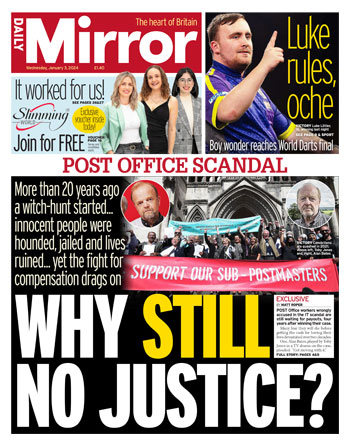
I owe the Daily Mirror an apology. Last time, I took a swipe at the paper over its Post Office splash “Why still no justice?”.
My point was that if you needed the word ‘still’, particularly with the emphasis of capitals, underscores or a change of colour, then it meant you were repeating old news.
I stand by that general rule. But this was an exception and, in fact, the Mirror was first out of the traps to capture the public mood that went on to dominate the news agenda for the past fortnight.
It was also cute in calling on the services of Rebecca Thomson, the woman who broke the story for Computer Weekly fifteen years ago. I was definitely wrong to take make that snidey aside and I’m sorry I did so.
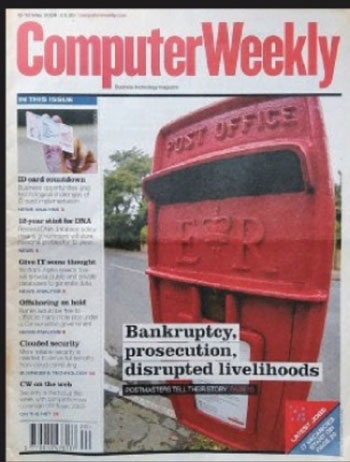
If I have an excuse, it is perhaps that, gripping as I found ‘Mr Bates vs the Post Office’, it told me little that I didn’t already know. I had assumed that this was because it had been so widely covered by every media. But looking more closely, I found that my knowledge came almost entirely thanks to Nick Wallis and Private Eye. Computer Weekly may have broken the story, but it was Wallis who brought it to wider public attention with his blogs, articles, radio and TV collaborations and book. Publication of that book pretty much coincided with the start of Sir Wyn Williams’s public inquiry and Wallis spoke to Ray Snoddy about his efforts in a must-read interview for InPublishing two years ago.
National newspapers, by contrast, have told me little. Until this month. Now they are coming up with all sorts of angles and disclosures. As Wallis himself said – rather generously – the TV programme stirred people into action and the more people start digging and turning up new material, the better. Tom Witherow of The Times is probably the pride of the pack, having worked on the story for some years, first at the Mail and now with the Thunderer.
Where were the nationals?
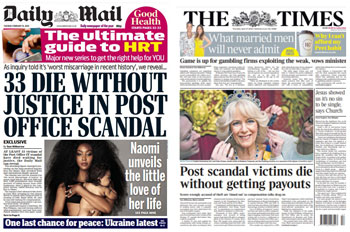
There are others, but the “dogged journalism” hailed by Press Gazette and in Times and Sun leaders has not generally been done by the nationals.
Between them, they ran just two splash stories on the scandal before that television programme aired (one in the Mail, one in the Times; these were essentially the same story – both by Witherow – written 14 months apart with the numbers updated). This year, there have been 39.
We all miss or underplay stories. I recall countless conversations with a close friend, a former editor who would berate me over the treatment of this or that. “But we did do it!” I would say. “Yes, but where? A small double in the middle of page 4? Who’s going to read that?”
This past week, it has felt as though the Murdoch dailies have caught my disease. The Sun’s political editor Harry Cole tweeted (or whatever you call posting on Musk’s platform now) that it’s inane to ask why the papers didn’t cover the scandal before, citing an internet search result showing hundreds of national newspaper mentions.
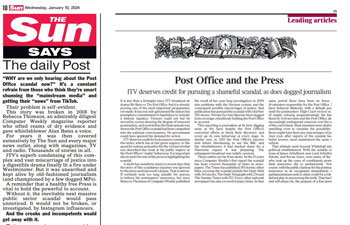
Then his paper ran a leader mocking people who “think they’re smart shunning the mainstream media” and getting their “news” from TikTok. They had only themselves to blame if they didn’t know about Horizon before. For years, it had been “covered extensively by the Sun and every major news outlet, along with magazines, TV and radio. Thousands of stories in all.” On Saturday, the Times was humming the same tune in its leader, using Cole’s search result figures, to demonstrate that the story had been covered “thousands of times”.
This all seems a bit defensive. And troubling. First of all, Cole’s figures are suspect (I’ll dive into those later). Second, it’s a bit naff, to say the least, to turn this scandal into an opportunity for self-promotion. And finally, because it demonstrates complacency when a bit of self-examination might be in order. If all of our national papers had, indeed, given the story the sort of coverage claimed by the Sun and Times, and still people didn’t take any notice, doesn’t it rather suggest that they have become irrelevant? Shouldn’t they be thinking more about how to get their message across more effectively?
Search criteria
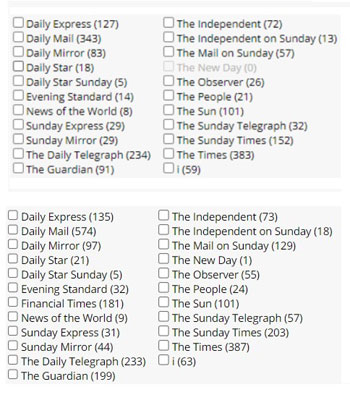
So, let’s have a bit of a delve into those Harry Cole numbers. I recognise that chart he tweeted as having been a screengrab from a cuttings archive with which I am familiar. I don’t know what he put in as his search term, but had a bit of a stab with a number of key words - postmasters, post office, horizon, computer, IT system – both alone and in combination, with the dates from January 1, 2009 to January 1 this year. ‘Post Office’ obviously returned the most results – nearly 4,000 for the Sun – while ‘Post Office’ and ‘computer’ generated numbers most closely aligned with those published by Harry Cole. (For most papers, at least, the results for the Mail and Guardian were wildly different.)
Now the thing about this site is that any search will throw up multiple results for the same story. This is because most newspapers have several editions – in the Times’s case London 1st, London 2nd, Ulster, Scot and Eire – and any variation from the original in the later editions will be returned as a hit in its own right. The search will also turn up TV listings and readers’ letters, which can hardly be counted as part of a paper’s coverage. It is possible to filter these out – but only by selecting the one section that you want filtered in. The problem with that is that if you choose “news”, you are denying yourself anything in business or features.
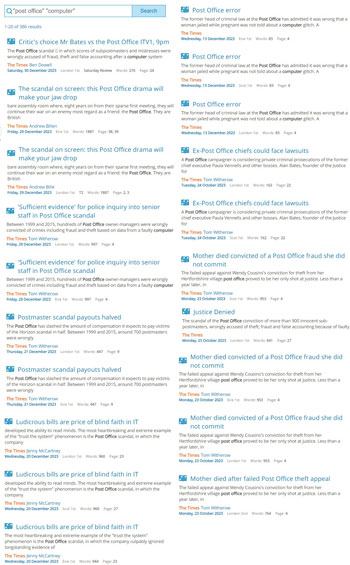
Above is the first page of the results (reconfigured for the purposes of making an image we can reproduce here) for the Times from my “Post office” and “computer” search – which came up with 387 items for the paper, against the 383 claimed in its leader. It soon becomes clear that for a realistic total number of stories on a subject, you can safely divide the figure in the national newspapers grid by three or four. That would still leave the Times and Mail totals at around a hundred, but it’s a stretch to talk of “thousands” across the board.
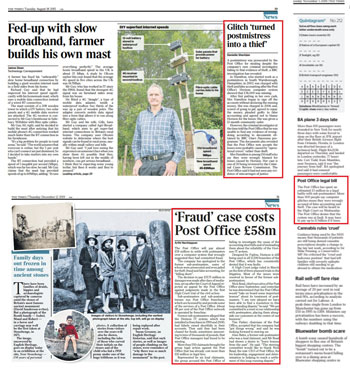
The Times first woke up to the story in August 2015 – more than five years after Rebecca Thomson’s Computer Weekly investigation – courtesy of a Panorama investigation, ‘Trouble at the Post Office’, which was co-produced by Nick Wallis. This made a 200-word top single on page 19, angled on Jo Hamilton. There was no follow-up. The paper went on to report in November 2018 that 500 postmasters were taking legal action that could cost the Post Office £1bn – in a 63-word nib. Again, there was no follow up. When they won their case a year later, The Times reported it in a double-column story on page 31 under the heading “‘Fraud’ case costs Post Office £58m”. It was all about the business, not the victims. Well, it was election day and most papers were too busy telling readers how to vote to pay too much attention to the postmasters. Their story finally started to be told when 39 had their convictions overturned on Maundy Thursday, 2021.
Since then, the Times has picked up the pace – it has been said that the biggest fight comes after the apparent victory and there has been plenty to fight for since. It has run five leaders, a big magazine spread and some 60 news stories, nearly half of those in the past year and 19 of them by Witherow. But, no, it did not run 383 stories mentioning the scandal as Saturday’s leader claimed, not even a quarter as many.
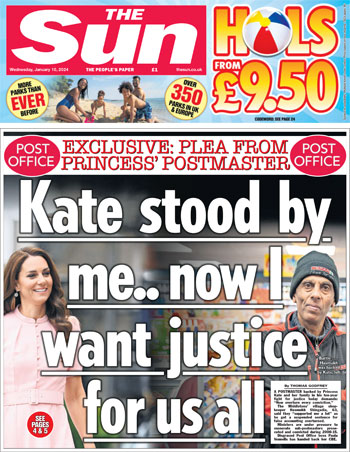
Turning to the Sun, I used that wider “Post Office” search term to check on its output and found 36 stories before the Mr Bates programme surfaced, and a couple more – including a spread on Jo Hamilton – shortly before it was broadcast. The scandal made the splash for the paper for the first and only time on Wednesday last week – angled on the Princess of Wales standing by one of the postmasters. That was the day the paper ran its “Daily post” leader in praise of the free press. It was also the day the number of stories the paper had carried this year passed the total of all those from the previous 15.
As it happens, the Sun had reported on “Kate’s postmaster” being prosecuted back in 2011 as part of its royal wedding extravaganza. Hasmukh Shingadia, who had been a guest at the wedding, was accused of false accounting. The story said he was due in court two weeks later. But the paper didn’t report that hearing, at which he pleaded guilty, or the one in July when he was given a suspended sentence, or the one almost exactly a decade later at which his conviction was overturned. Indeed, Sun readers have never heard of him since – until the “Kate stood by me” story last week.
So, playing Harry Cole’s numbers game, the Sun’s tally now stands at 37 stories before Mr Bates, 59 after, with today’s offering back down to a nib on page 2.
Due prominence?
But it’s not quantity, but quality, that matters. And projection. We have seen that Kate was the Sun’s first post office scandal splash, but its “extensive coverage” probably had some big numbers back through the years before “Mr Bates”?
Well, there were four inside news page leads – one published only in Scotland – and two opeds. The Scottish one was headlined “PO cash scandal wrecked our lives”, which was based on victims’ evidence to the inquiry in Glasgow. That and the opeds were the only articles the paper had carried that actually told any of the postmasters’ stories at any length. The other page leads concentrated on the successful appeal against convictions and the compensation negotiations. The pre-ITV coverage also included four columnists opining and three leaders. Apart from those, few stories ran to even 100 words and a couple of those were “doubles”, ie, the same story appearing in two sections – in this case news and biz – of the same paper.
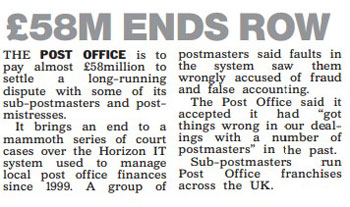
Perhaps the most telling nugget to emerge from this marathon trawl through 4,000 search results was the second story to appear in the paper, which was at the foot of the City page in December 2019. It was headlined “£58m ends row” (the judgment in the class action) and referred to a “long-running dispute” and a “mammoth series” of court hearings. Yet The Sun had previously written only 63 words on this “long-running dispute”, on page 37 in August 2013, and not a word (so far as I can find – please do correct me if I’m wrong) on the court cases. The news line was the cost to the Post Office. And “ends row”? Right. We know how that one turned out.
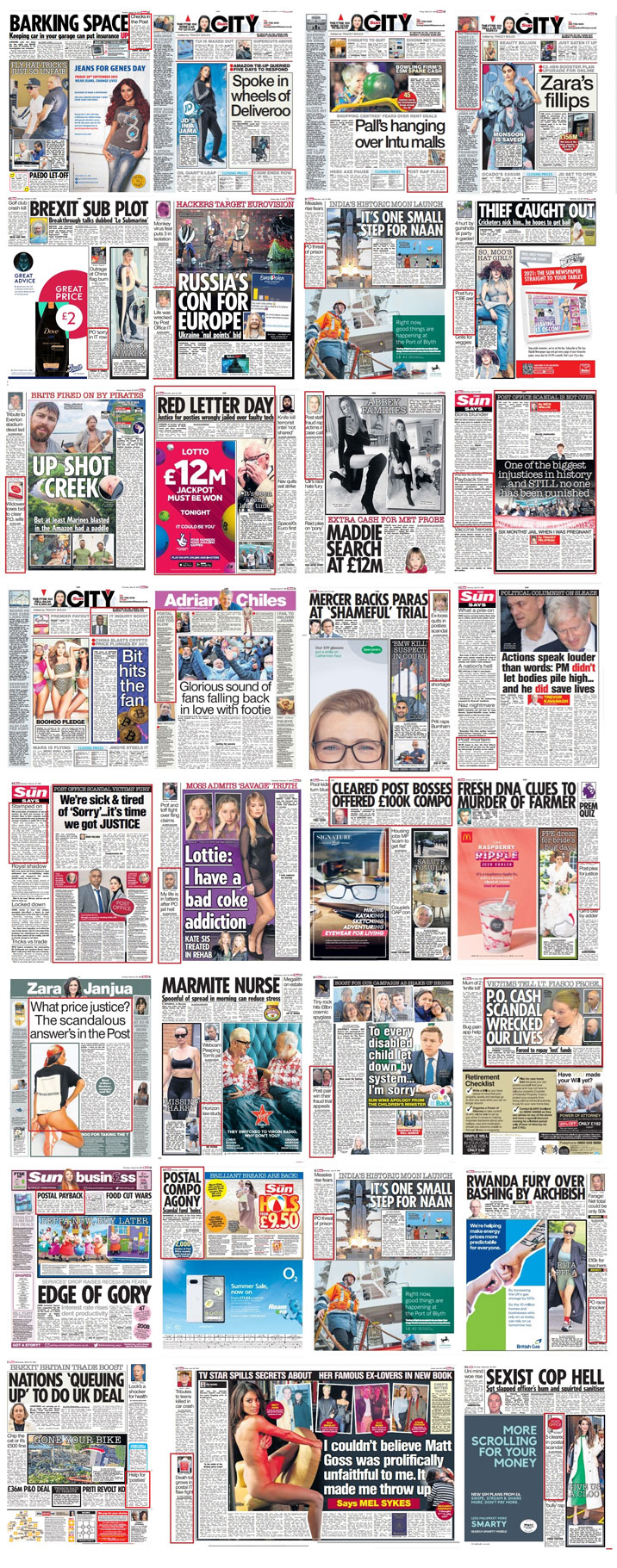
As part of this exercise, I built a montage (above) of all the Sun’s stories, showing the whole pages on which they appeared to give context of what the paper thought important at the time. Then, I followed a suggestion from my long-suffering husband, and transplanted them all on to blank Sun-size “pages” to see how much newsprint they had occupied. They didn’t quite fill five. That’s 15 years’ coverage we’re talking about. Just imagine how many such pretend pages it would take to accommodate everything it has written about migrants or the royals or even Kyle Walker.
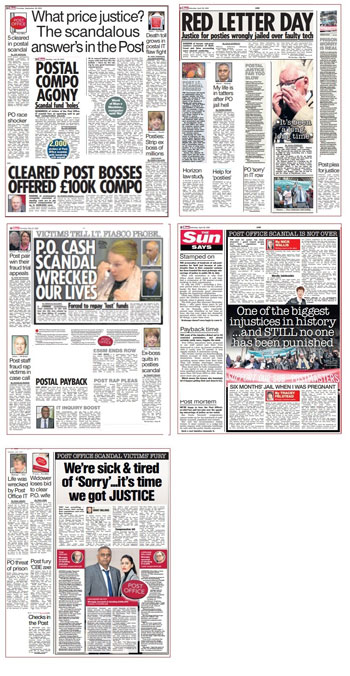
I alight on Walker because he’s been all over the Sun’s front pages this past week. In fact, let’s not pretend. Here is a montage of his appearances in the news, as opposed to sport, section since late August last year. If you took out the furniture and stuff round the edges of these 21 pages, the stories about him would still fill 15. That’s three times as many in five months as the Post Office scandal got in 15 years.

Essay subject for journalism students: define “extensive coverage”.
Delusional...
In conducting this little audit, my aim isn’t to suggest that the Sun or Times were any worse than most of Fleet Street – or even that they did anything wrong. But if you’re going to brag about your “extensive coverage” and complain when people ask, “What were the press doing while all this was going on?”, then you invite examination of your efforts. To suggest that you highlighted an issue because you ran four page leads, a collection of three-par stories and shouted from your leader column a couple of times – and then to tell readers that people didn’t realise what was happening because they were too busy looking at TikTok on their phones to pay attention to “real” news outlets – is plain bonkers.
It’s frustrating when – like me with those stories that were underplayed way back when – you think you have been on the case for yonks and someone fresh comes in and blows it all out of the water. But let’s have a bit of realism please. In his InPublishing newsletter last week, James wrote that legacy media must be perplexed. Maybe so. But also deluded.
What does campaigning journalism look like?

So, if you want people to take notice of an issue you think is important, what do you do? The Mail is the master of campaigning journalism. It knows how to set it all up and then go bam! with all guns blazing. Its anti-plastics effort from February 2008 is exemplary. Splashes, opeds, leaders, big name backers, case studies.
Or you can hammer your message home, day after day, splash after splash. As it did with Keir Starmer and “Beergate”, running seven lead stories on the trot.
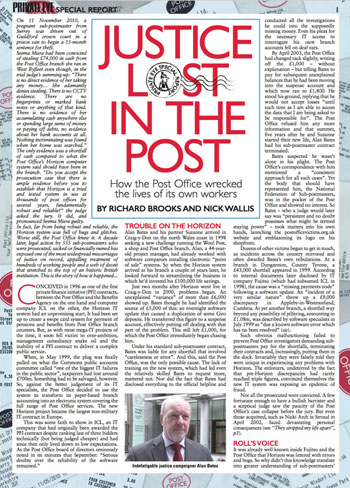
We had none of this with Horizon – other than from Computer Weekly at the outset, when Rebecca Thomson had seven case studies ready to go before publishing her scoop. And in Private Eye’s special ‘Justice Lost in the Post’. And the TV and radio programmes (Radio 4 has broadcast “The Great Post Office Trial” three times – in 2020, 2021 and 2023). The Mail did, however, do more than most. Two or three spreads over the years (sometimes on the back of one of those other media efforts) and, later, regular stories from Tom Witherow. Unlike the Sun, it did focus on the people rather than the business.
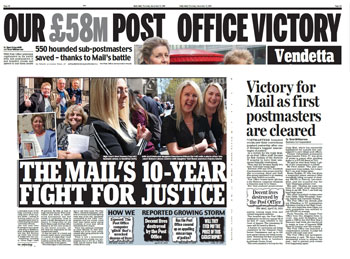
But was this a campaign? And if so, what was it campaigning to achieve? Justice? That’s a bit nebulous. It didn’t find lawyers to take up the case. It didn’t get MPs – or anyone of influence – on board to ask questions of ministers or of the Post Office or of Fujitsu. Reporting on progress in a legal process doesn’t really constitute campaigning. Yet at every big moment, it was there claiming, “it was us wot won it”: “Our £58m victory”, “Victory for the Mail as postmasters cleared”, “Mail’s ten-year fight for justice”. The justification for these boasts being ragouts from stories that had all been printed way back in the book.
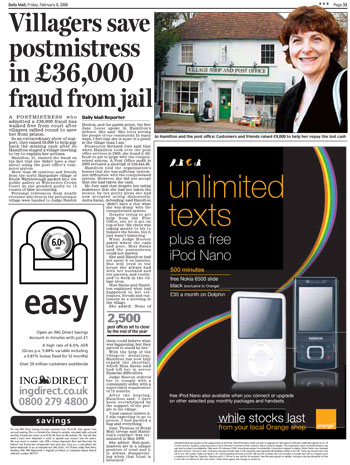
The Mail did have one other USP though – it reported Jo Hamilton’s original conviction in 2008. Not because it foresaw the scandal that would unfold, but because it recognised that there was something special about 60 people turning up to cheer a defendant in court. The Mail has, and always has had, acute news antennae. The questionable stuff is whether – and how – it responds to the signals those antennae pick up.
Impact of ‘Mr Bates vs The Post Office’
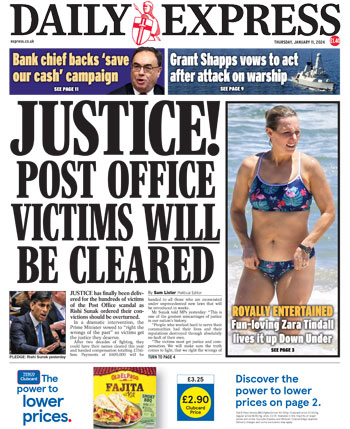
So much for the past, what’s going on now? Well, that show certainly jolted the Press – and the politicians - into action and there have been results. Rishi Sunak is to bring forward primary legislation to quash some 700 convictions and compensation has been promised (the £600,000 in the headlines last week had already been on the table, contingent on the convictions being overturned – as reported by Witherow last September – so is not new money or a kneejerk reaction to the TV series).
“Justice!” cried the Express in delight at the news. Is this justice? Lawyers and some postmasters are not so sure. Not because the promised compensation doesn’t begin to cover the real and emotional costs many of the wrongly convicted have had to bear. Not because some guilty may be exonerated and make money to boot. But because a blanket acquittal denies those individuals the right to say, “I proved I was innocent”. And because it is a terrifying constitutional precedent for parliament to start overturning decisions made in the courts.
Most leader writers felt this was a risk worth taking to expedite cases that have taken too long to be considered by the courts. There are reassurances that this will be a truly exceptional case. But, my word, this is dangerous. We have seen from the Mail’s “Enemies of the people” and Boris Johnson’s calls for judges to be “more democratic” how fragile the judiciary’s independence of the executive is. One-offs tend not to be one-offs. There will be another instance down the road. And then another. At least the Times, Telegraph and Mail addressed the qualms over the court’s independence rather than blindly cheering good old Rishi. The Sunday Times went one better with a piece by former DPP Ken Macdonald explaining why this may be less than a good idea.
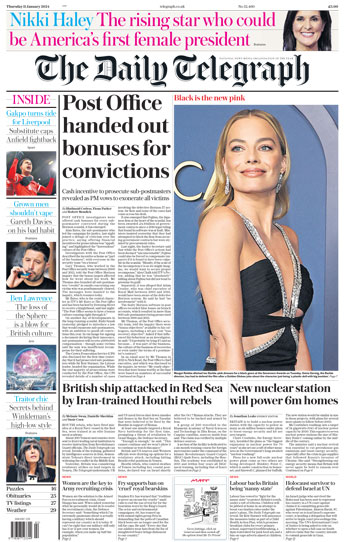
While the Express was celebrating “Justice!” the Telegraph took a different approach to the saga, coming up with an excellent splash, “Post Office handed out bonuses for convictions”. The text matched the promise of the headline. Investigators had been offered cash for every successful prosecution, with everyone on the security team “on a bonus”. This gem had, according to the Telegraph, “emerged”. It also “emerged” that Fujitsu had been awarded billions of pounds of government contracts since the courts ruled that its Horizon software was dodgy.
“Emerging” is journalese for what facts do when journalists finally start looking for them. Usually after they’ve been in plain sight for ages. The bonus-for-convictions culture claims had been there for anyone who cared to look for at least a month before the Telegraph picked up on them. They came in witness statements by former investigators who gave evidence to the Williams inquiry on December 7.
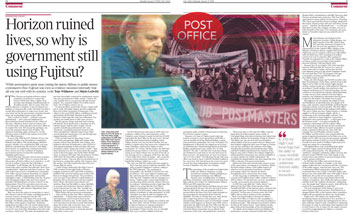
The Fujitsu contracts have been in the public domain all along. Even with coverage of the scandal gathering pace, the Sunday Express was alone in reporting last year that the Post Office had extended its contract for Horizon. As chancellor, Rishi Sunak acceded to a Post Office request two years ago that the government take on the burden of paying compensation to the victims, so he was well aware of the scandal and of Fujitsu’s part in it long before Mr Bates aired. Yet during his time in 10 and 11 Downing Street, the company has won a further £3.6bn of government contracts. Meanwhile, his wife received more than £6m last year in dividends from her father’s company Infosys, which has been in partnership with Fujitsu since 2022. How much of that have you read in the national press?
Ministers say that attempts to block Fujitsu from further contracts had been stymied by procurement rules. And our newspapers, the newspapers that have been accusing Ed Davey of being too easily fobbed off, did they go into details of what these rules were that prevented them giving billions of pounds to a company it had no faith in? Did they even ask? The Times did in a spread on Saturday, but it was a rhetorical question in a headline over a good “new readers start here” history of the company’s role in the saga. It did not come up with an answer. The Guardian said people would indeed be asking that question, but again failed to answer it.
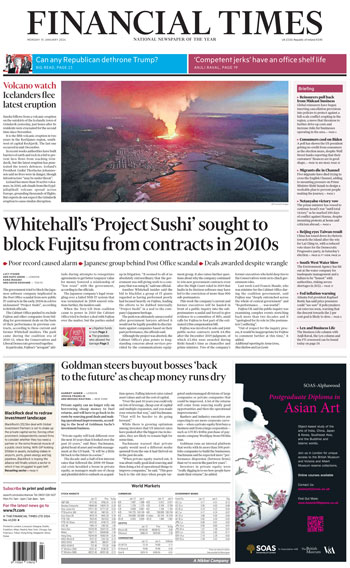
The FT did. It reported on Monday that Fujitsu (then ICL) had been in a legal tussle with the Blair administration over its failed IT system for the NHS that led to the contract being terminated. The coalition tried to bar the company from future contracts, but government lawyers told them it would not be lawful to discriminate against any business on the basis of past performance. Blimey. That explains a lot. And not just about Horizon. Could we get Common Sense Tsar McVey on to this?
But back to those bribes for convictions. Investigators Gary Thomas, who was involved in the prosecution of a postmaster who died without his name being cleared, and Mike Wilcox gave some pretty damning testimony to the inquiry. There has been plenty of that in the current phase, covering the action taken against sub-postmasters, which has been running since July last year. But there was no one from the nationals there to hear them. If they can’t be bothered to staff up the Covid inquiry unless there’s a big-name witness, they’re hardly going to send reporters to the postmasters – or the contaminated blood hearings down the corridor. Heaven help us.
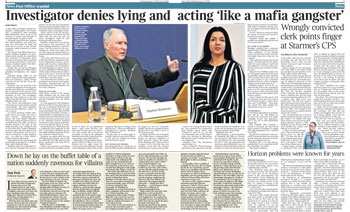
But they were out in force the next day when the inquiry resumed its hearings for the first time since the airing of “Mr Bates”. Unluckily for Stephen Bradshaw. Had he not switched his date with the witness box from November, the world’s press wouldn’t have been there to hear Jacqueline McDonald describe him and his fellow investigators as “mafia gangsters”. The sketchwriters wouldn’t have turned out to depict him as a “pound-shop Pol Pot” or the “kind of tough-guy Scouser who arrives like Genghis Khan at some quiet corner shop somewhere, likely to frighten some poor soul who's not done anything wrong into saying things that will only ruin their lives yet further”.
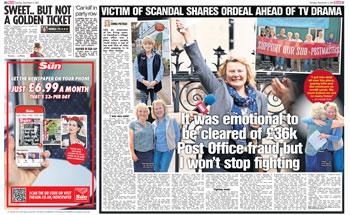
If only the TV teams in features had tipped their newsdesks the wink about the gold-dust in the festive line-up, reporters might have been there to hear Thomas and Wilcox too. The schedules had been published in November and TV writers were presumably sent advance videos. Andrew Billen wrote in the Times at the end of December that the miniseries would make your jaw drop, but by then the inquiry had packed up for Christmas. The Sun, however, ran its Jo Hamilton spread two days before Thomas and Wilcox gave evidence. It went back over the history (for the first time in any detail), but the paper didn’t think to look and see what was happening now, beyond saying that the inquiry was “still ongoing”.
Still, you can’t entirely blame the papers for not realising this would catch the public mood. ITV didn’t either. Its press release on the festive schedules runs to 21 pages and lists 21 programmes, starting with a drama called “The Winter King”. It got 5.7m viewers. Mr Bates vs the Post Office was the 21st of the listed programmes. It averaged just under 10m across the four episodes.
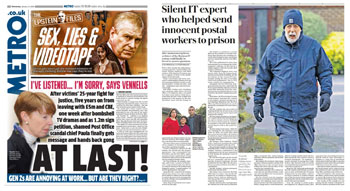
The blame game is now running at full pelt. Former Post Office CEO Paula Vennells, the arch villain of the TV series, has handed back her CBE, the director of communications has been suspended, current chief executive Nick Read is having an uncomfortable time. The man described as the “chief architect” of the Horizon system and whose expert witness evidence led to some convictions is being hunted down. Fujitsu and its government contracts are under scrutiny. I’d dearly like an answer to Jo Hamilton’s question, “What happened to the money?” And also, how much did the Post Office take from its sub-postmasters? I guess we’ll never know because while we’ve heard the tales of people who lost their life savings, remortgaged and were still bankrupted or jailed, there must have been many up and down the country who dug into their own pockets to make up non-existent shortfalls of a few hundred or a couple of thousand pounds, thereby escaping the attention of their bosses. Did the total run into hundreds of thousands? Millions?
All Ed Davey’s fault?
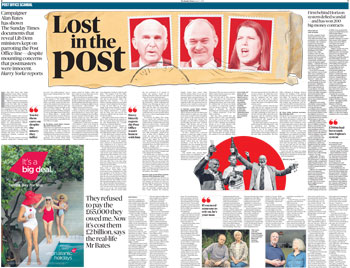
And what of the people who were in power? It didn’t take long for the outrage at the treatment of the postmasters and the baying for the blood of Post Office villains to turn political. It’s an election year, after all.
This scandal is essentially about malicious prosecutions and the subsequent cover-up. And the period over which it has played out has coincided almost exactly with a period of Conservative rule – first coming to light the year before Cameron moved into Downing Street.
It obviously had its roots further back, though: the prosecutions started during the Brown administration and the Horizon system was ordered and installed during the Blair years. So Labour is being hauled into the frame to take some responsibility. But it’s a bit desperate. Alan Bates first raised questions about the system in 2000 and had his contract terminated in 2003, but while individual postmasters and mistresses were fighting their cause, they didn’t come together until 2009 – a full decade after the prosecutions started.
The failings of the Horizon system might have been the subject of tut-tutting, and there might well be justifiable questions about procurement policies, but what projects this scandal into the stratosphere is the human cost, the prioritising of a business reputation over the lives of innocent people. And that all happened under the Conservatives.
The first five years of their rule was, however, in coalition with the LibDems, who were given some mostly minor ministerial posts – responsibility for the Post Office among them. Norman Lamb, Jo Swinson, Jenny Willott and Ed Davey all held the job. Since the Conservatives secured an overall majority in 2015, there have been a further eight holders of that office. But all eyes have been on Ed Davey.
Like most of the others, he was approached by Alan Bates’s Justice For Sub-postmasters Alliance to look into the Horizon problems. While he did eventually become the first minister to meet Bates, he had previously repeatedly rebuffed him, accepting instead the Post Office’s assurances that all was ok and that only a small number of people were affected. For this he is now being pilloried. Mostly because, if I may dare say, he is the leader of a party that has taken a number of Tory seats in by-elections and which is likely to take more before the year is out. And possibly because he also has a rather irritating habit of calling for the resignation of just about anyone in public life who fails to score 100% on the successometer.
Some papers have described Davey as “the minister at the time”, which is a bit rough on someone who had tenure for just two years in the quarter century that this horror show has been growing. They may or may not have been the key two years – 2010 to 2012 – but even so. Sixteen other people have done that job over the past 25 years.
The Sunday before last, the Sunday Times ran a Harry Yorke special on the LibDem ministers “who kept parroting the Post Office line – despite mounting concerns that postmasters were innocent”. This was courtesy of documents provided by Bates. As we’ve seen, the prosecutions started in 1999 and continued until 2014. The struggle for justice and retribution continues, ten years on. Yet Yorke’s investigation covers only the five years of the coalition from 2010 to 2015, when LibDems happened to hold the Post Office brief. Isn’t that a bit selective?
If you look at the JFSA website, there is an update from June 2015 after the Tories won their outright majority. Mr Bates had written to the new minister on May 19 (I’m pretty sure it was Baroness Neville-Rolfe, but he doesn’t name her), outlining the history and inviting him/her to take action. He does not seem to have got satisfaction, since the update notes that it was obvious that the minister hadn’t read the Second Sight report or understood its gravity. “Furthermore, it [the response] demonstrated that they had no interest in a matter so serious, that it not only affected all those in the scheme but to a certain extent had an impact on every sub-postmaster in the country.”
Neville-Rolfe did, however, ask the then Post Office chairman to commission a review of the Horizon system and in 2020 Paul Scully, then the serving minister, told a select committee that its preliminary findings were that there were no systematic problems with Horizon. Jonathan Swift’s review, published in full two years later, did, however, raise serious concerns about postmasters being encouraged to plead guilty in exchange for lighter sentences.
The JFSA archive also includes letters to Scully and his predecessor Kelly Tolhurst. These went back over the history and asked, among other things, for the government to repay the postmasters their legal costs from the successful class action in 2018-19, requests that were denied.
Not just the LibDems then.
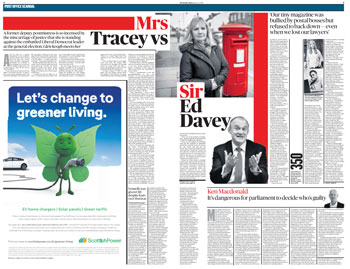
The Sunday Times website recognised that this week with a story, again by Harry Yorke, “Alan Bates letters show Tories ignored postmasters too”, which addressed that correspondence with Scully. But it did not make it to print. Instead, the paper’s spread was focused on “Mrs Tracey vs Ed Davey” – a former subpostmistress who says she is going to stand against him at the election.
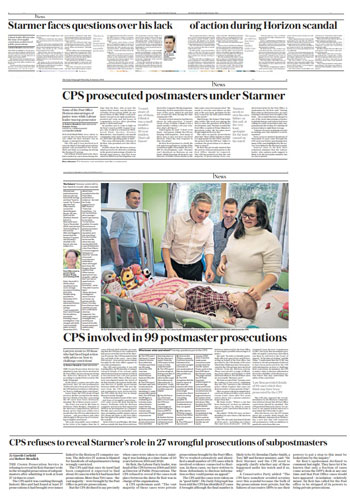
Almost everyone has been gunning for Davey; his failure to appear in the Commons, his refusal to say “sorry” to an ITN reporter. Some – the Telegraph in particular – have also been trying to get Keir Starmer into the frame. These were private prosecutions, but a few, possibly as many as a hundred, went through the CPS. And as a DPP overseeing more than 150,000 prosecutions a year, Starmer must surely have taken a personal interest in giving the go-ahead for a case against a sub-postmaster suspected of having his fingers in the till. The terrorism and the murders and the rapes and the stabbings and the burglaries would all naturally be subordinate to such a crime in his list of priorities. Honestly, it really is so transparent and so pathetic. And it’s only going to get worse.
Then there’s the ideological stuff – Ross Clark in the Sun saying the scandal “debunks the belief that only private firms can be rotten” and the Mail leader about this “catastrophic failure” being a stark reminder of the perils of state control – why nationalisation is “deeply undesirable”. Private businesses that harm people, it concludes, are much more likely to be punished for their mistakes.
Like the water companies perhaps?
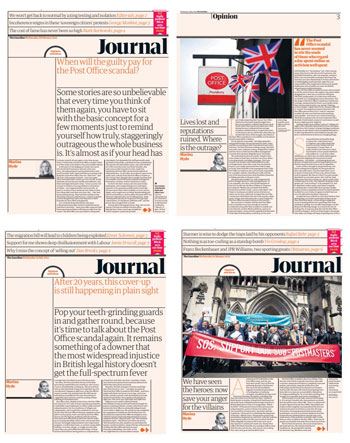
Am I being churlish? Probably. The claiming of undeserved credit sticks in the craw, especially as it took most of our newspapers an awful long time to climb aboard this juggernaut. But since they did, important information that had previously lain unnoticed in the JFSA archive, on the inquiry website or in Nick Wallis’s blog has found a wider audience. Better late than never I guess. And more people are coming forward with new information. More “mainstream” journalists have started digging. As I say, some had been on the case before, even if their publications never properly got to grips with the story. For a start, please do read the Guardian’s Marina Hyde. I think we can safely say she’s now got her “full spectrum fever”.

Now the caravan is starting to move on. First there was the small matter of our military venturing into the Middle East conflict with air strikes on Yemen. But that was just the briefest interruption as the Press got back to business as usual. More allegations against Prince Andrew, the late Queen being “furious” that Harry and Meghan called their daughter Lilibet, Holly Willoughby returning to our screens with Dancing on Ice, the weather turning cold in January.
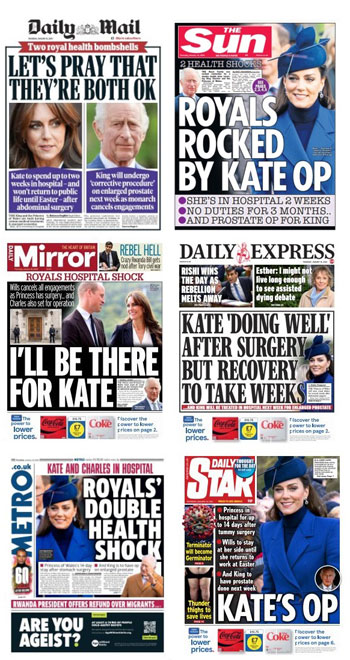
Today, of course, we’re on full-throttle mawkish sycophancy with the news that both Kate and her father-in-law (I know protocol dictates that the King should have precedence, but we know who’s the more important - and, to be fair, newsworthy - one here) are having hospital treatment. I have to admit that, if you like that kind of thing, both the Mail and Sun fronts are rather elegant.

And the Rwanda bill is back in Parliament with Sunak struggling to find that Goldilocks spot between those in his party who think it too tough and those who think it too soft. Another five people drowned trying to cross the Channel at the weekend, which you might think would be a factor in that debate. Silly me. The i and the Times both led on Rwanda on Monday – the former on Rwandans being granted asylum here even though their homeland has been declared safe by our government, the latter on the Tory manoeuvring – neither mentioned the latest deaths. Congratulations, then, to Metro for cutting through the slogans to get to what is supposed to be the point of this policy.
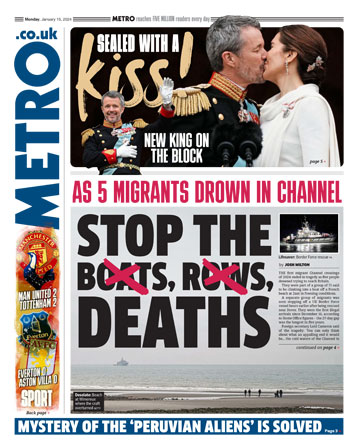
I have got that right, haven’t I? “Stop the boats” is entirely about thwarting the nasty people traffickers and saving lives. Isn’t it?
Press Awards
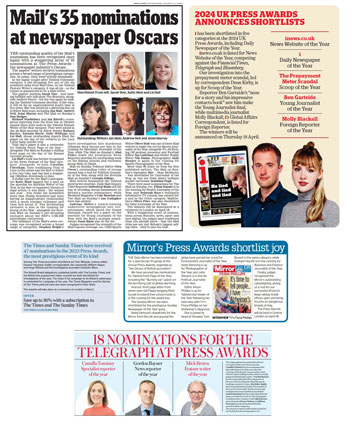
I thought there was cause for modesty among our newspapers, given their slow uptake on the Post Office scandal. Yet, as we’ve seen, there was bragging. I thought a couple of Mail front pages highlighted below were ugly. But the paper may be so proud of its efforts that they find their way into the entries for next year’s press awards.
This year’s shortlist was published yesterday and the Mail devoted the top half of page two to trumpeting its 35 nominations for the newspaper “Oscars”. It has clearly been taking lessons in concealment of lights under bushels. For this rundown of the nominees contained only three “outstandings” and three “staggerings”. Well, “jaw dropping”, “prestigious”, “brilliant” and “brilliance” did put in an appearance a couple of times each, so maybe a little more tuition is required. Other modest adjectives included “unprecedented”, “peerless”, “courageous”, “brave”, “trailblazing”, “stellar”, “unstoppable”, “remarkable”, “legendary” and “best”. This “glittering line-up of stars” was responsible for “bombshell news” and “devastating exclusives” and “dominated” the field. Well done them.
In the meantime, the Telegraph highlighted three of its 18 nominees, the Mirror found “shortlist joy” in being nominated for “a spectacular 10 gongs”, while the i headlined its panel on its five nominations “2024 UK press awards announces shortlists”. Now that’s what I call modest. The Times, which, with its Sunday sister, had the most nominations with 47, was similarly restrained, while the Guardian (41, including the Observer), the FT (18) and Sun (9) were too bashful to mention the awards at all – yesterday, at least.
In case you were wondering, 229 individuals, teams and publications have been shortlisted for the awards to be presented in April (not March as the Times reported). I’m sure at least some of them were peerless, trailblazing and jaw-droppingly brilliant. Because there is good and even excellent journalism being done out there.
Just not quite as much as the chest-beaters would like everyone to believe.
Front page of the fortnight
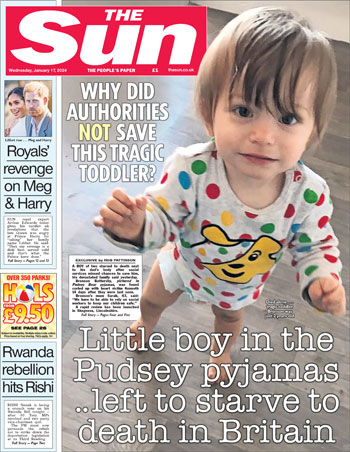
That Metro “Stop the deaths” cover was to my mind one of the best of a mediocre bunch over the past couple of weeks – but the Sun’s heart-rending front on Bronson Battersby yesterday was a true human interest scoop that I could hardly bear to read. It left the rest of Fleet Street flat-footed – everyone’s followed up today, but only the Mirror scrambled in a little story in its second edition yesterday. What a shame the Sun couldn’t resist diluting it with the royals, the rebels and the cheap holidays (albeit very cleanly). If it had, this would have been a classic.
The Sun has also blown it today by – in common with the Mail – turning his family videos into clickbait. It’s just awful.
Ugliest front page…
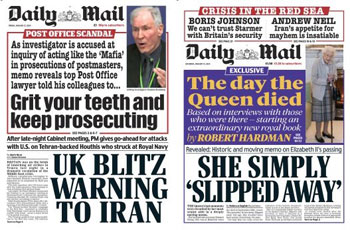
On the other side of the coin, two front pages stood out (again my personal opinion) for their ugliness. I’m talking appearance here, not content.
Tabloids always work best when there is one huge story. The workaday is one main story with puffs at the top and maybe a single down the side. The worst configurations come in trying to give two elements equal billing. It suggests an inability to decide what matters most.
The first of these successive Mail pages falls into that trap and is made worse by its five stacked headlines that are like a classroom rabble where everyone is shouting on top of each other. It takes a while to realise that there are two stories being told here – one of them a threat of war.
The second does have one central story – the death of the Queen – with a puff box above the titlepiece. But it doesn’t look as though it has: the coloured bit with the picture in the middle feels disconnected from the story below.
I have to admit that my eyes went straight to the splash headline and my first reaction was one of surprise that the Mail should be leading on Annie Nightingale (it wasn’t). Still, this one beats the previous day’s efforts in one respect. It has not five but seven headlines on top of each other. In eight different type sizes, five different fonts, three different colours and on three different coloured backgrounds. With caps, italics and underscores thrown in for good measure.
What is going on at the Mail? It knows how to produce a stunning front page. Dacre must be foaming at the mouth.
Alison Phillips

I started this Notebook saying “I’m sorry” to the Mirror. I’d like to end it by saying “I’m sorry” about the Mirror. Specifically that Alison Phillips is off. Whoever heard of an editor taking voluntary redundancy? It does not augur well for a paper whose owners (Reach) have imposed savage cuts on staff and budgets. The Express has been an irrelevance for years, but that doesn’t matter really. There are plenty more papers to project the same world view. But the left has only the Guardian and the Mirror. The People is already the Sunday Mirror wearing a different coat and both are struggling. If the daily is allowed to wither further, there will be no popular newspaper to offer an alternative narrative. This is alarming.
But instead of doom-mongering, let’s remember that in her five years in the chair, Phillips has presided over some excellent journalism, not least the blasting open of Partygate. Her paper has chronicled the strains under which the health service is operating, understood climate change, and always retained its essential humanity. These are some of what I believe to be her greatest hits.

Liz Gerard’s Notebook is a fortnightly column published in the InPubWeekly newsletter. To be added to the mailing list, enter your email address here.












